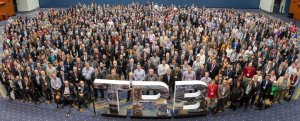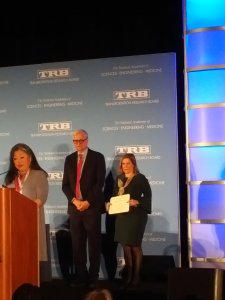
Approximately 14,000 people attended the TRB Annual Meeting, and Dr. Feeley was honored among them when she received the William W. Millar Award for best paper in the area of public transportation. Photo ©TRB.
A recent paper from Rutgers CAIT validated the Paratransit Skills Assessment and found it can predict an individual’s ability to use paratransit services with greater than 96% accuracy. Designed to help adults on the autism spectrum, the test is a first step toward helping these people use vital transportation services that connect them with friends, family, educational opportunities, health care services, and more.

Dr. Feeley won the William W. Millar Award for best paper in the area of public transportation at the 99th Annual TRB Meeting. Photo ©CAIT.
The Transportation Research Board Executive Committee awarded Dr. Cecilia Feeley with the William W. Millar Award for best paper in the area of public transportation at the 99th Annual TRB Meeting this January.
Dr. Feeley, the Autism Project Manager at Rutgers Center for Advanced Infrastructure and Transportation (CAIT), is the first Rutgers researcher to receive the award. Her paper, “Validation of the Paratransit Skills Assessment for Paratransit Travel and Mobility of Adults on the Autism Spectrum,” verified the accuracy of The Paratransit Skills Assessment (PaSA).
Developed by researchers at Rutgers, the PaSA is a criterion-referenced assessment and first step toward helping people on the autism spectrum access public paratransit services. The test helps determine the capabilities of individuals as well as the skills required for using Americans with Disabilities Act (ADA) complementary paratransit, curb-to-curb paratransit, door-to-door paratransit, door-through-door paratransit and hand-to-hand paratransit, Dr. Feeley explained.
The results of this latest paper found that the PaSA can predict the capabilities of individuals on the autism spectrum to use paratransit services with greater than 96% accuracy.
“The research findings including the high accuracy rate provide validation that the PaSA is a reliable method for predicting an individual’s ability to use paratransit services independently,” Dr. Feeley said. “These validation results can be useful for transit providers, transportation experts, and professionals working on issues with transportation-disadvantaged populations.”

Dr. Feeley receives her award alongside Neil Pedersen (middle), TRB Executive Director, and Hyun-A Park, chair of the TRB Policy and Organization Group (left). Photo ©Branislav Dimitrijevic.
Studies have found that the primary mode of transportation for adults with autism is riding as a passenger with parents and other family members, she said. So, paratransit services can significantly help these individuals get around independently — but first it is important to ensure they are capable of properly using them.
For example, Rutgers research from 2015 found that out of the 703 adults on the autism spectrum who responded to a study on the use of paratransit services, 66% were aware of the ADA complementary paratransit services and 40% were aware of community-based paratransit services. Only 26% were able to use ADA complementary services and 9% were able to use community paratransit services.
“Without adequate access to transportation, adults and adolescents with disabilities cannot secure competitive employment opportunities, attend their preferred educational and vocational programs, use health-care services, or participate in integrated community life,” she said. “For individuals on the autism spectrum, mobility is a critical factor for independence and community integration.”
Dr. Feeley received her award and was honored among her peers at the Thomas B. Deen Distinguished Lecture and Presentation of Awards on Monday, January 13. Established in 2012 in honor of William Millar who served as the 1992 TRB Executive Committee Chair; a TRB Executive Committee member, and President of the American Public Transportation Association among other positions, the award recognizes the best paper in the public transportation field each year.
“It is such an honor to have this work recognized by the William M Millar award,” Dr. Feeley said. “I spent 10 years of my life working on the Paratransit Assessment -‑ I felt that it was such an honor that it was selected for publication let alone winning an award. Thank you for the National Academies Transportation Research Board for this recognition of my research and my life’s work.”

